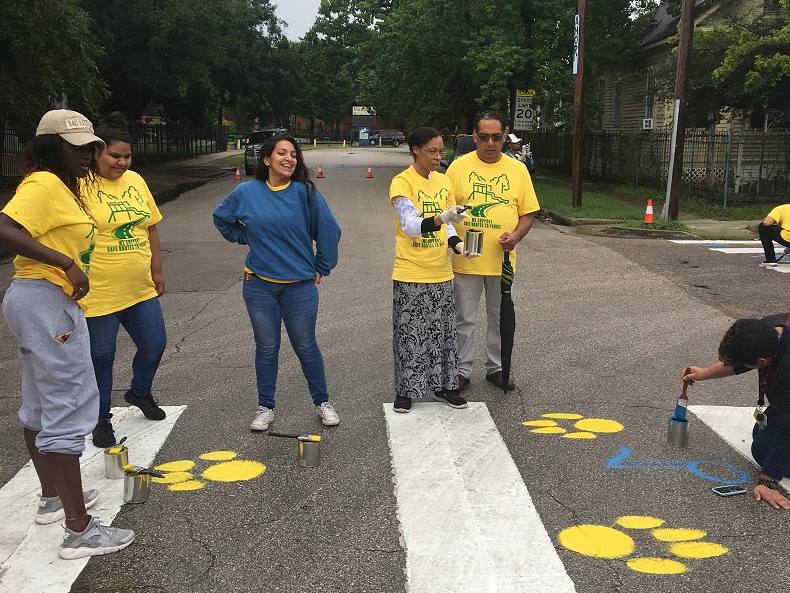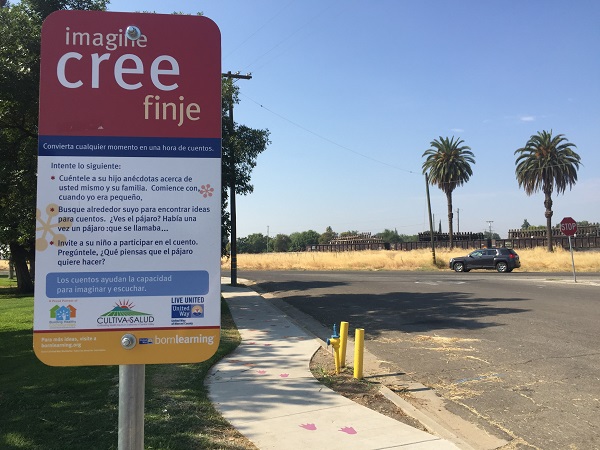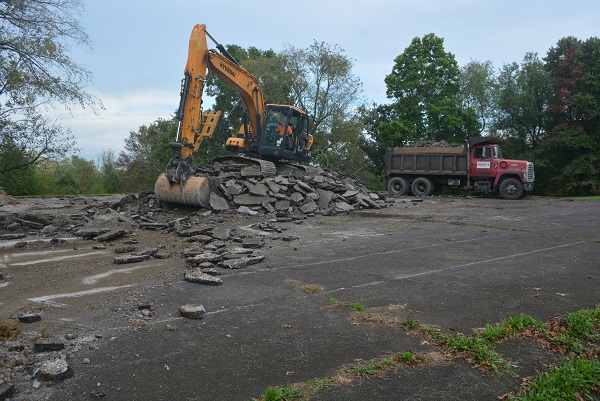Colorful crosswalks. Temporary bike lanes. Playful paths. Creating new green space. These are just a few ways to improve local park access. We just wrapped up work with our first cohort of communities in the Safe Routes to Parks Activating Communities program, which provides individualized consultation, group trainings, and grant funding to nonprofits to improve safe, equitable park access in their communities. The Safe Routes to Parks Activating Communities program aims to remove barriers that make it hard for people to enjoy the physical, social, and mental health benefits that parks offer and proactively work toward making it easier and safer for people to walk, bike, and roll to their local park or green space.
In six months and with $12,500 in grant funding, ten organizations from across the country partnered with community organizations and residents to assess community priorities through surveys and walk audits, developed priority areas, identified actions and policy improvements, and figured out how to sustain their efforts. On top of this planning process, each community implemented at least one early action from the plan to get more people interested and invested in improving safe walkable, bikeable park access.
We are so proud of these organizations and the tangible impact they’ve made in their communities! Here are some ways in which these communities have increased awareness and garnered local support for Safe Routes to Parks by moving beyond their plans to actions:
 Colorful Crosswalks – CAN DO Houston partnered with residents, students and staff at nearby schools, the city’s department of public works, local law enforcement, and the Mayor’s Office of Special Events to temporarily enhance three crosswalks with art near Castillo Park and Marshall Middle Academy of Fine Arts. This increased the visibility of crosswalks between the park and school that is often used by students and drew attention to the need for a permanent enhancement of these crosswalks.
Colorful Crosswalks – CAN DO Houston partnered with residents, students and staff at nearby schools, the city’s department of public works, local law enforcement, and the Mayor’s Office of Special Events to temporarily enhance three crosswalks with art near Castillo Park and Marshall Middle Academy of Fine Arts. This increased the visibility of crosswalks between the park and school that is often used by students and drew attention to the need for a permanent enhancement of these crosswalks. Playful Path – Cultiva La Salud partnered with residents, the town and county parks and recreation department, United Way of Merced County, and Planada Elementary School District to decorate a path between Houlihan Park and Planada Elementary with art and to install educational signs in English and Spanish, with activities for families to complete on the journey between the park and school. This playful installation offers an interactive experience for youth and supports early learning along the route from the school to the park.
Playful Path – Cultiva La Salud partnered with residents, the town and county parks and recreation department, United Way of Merced County, and Planada Elementary School District to decorate a path between Houlihan Park and Planada Elementary with art and to install educational signs in English and Spanish, with activities for families to complete on the journey between the park and school. This playful installation offers an interactive experience for youth and supports early learning along the route from the school to the park. Pop-Up Bike Lanes – Community members shared that they were not riding bikes because they did not feel safe on the street and did not know where to bike to. In response, REV Birmingham Zyp BikeShare partnered with residents, parks and recreation, transportation, law enforcement, and bicycle advocates to re-locate a bikeshare dock from a busy arterial street to within Memorial Park, focusing attention on an enjoyable, healthy destination. To make people feel safer on the ride, they temporarily installed bike lanes along the route from Smithfield Library to Memorial Park, complete with motivational and directional signage. This called attention to the need for improving bike facilities around key community destinations, like libraries and parks.
Pop-Up Bike Lanes – Community members shared that they were not riding bikes because they did not feel safe on the street and did not know where to bike to. In response, REV Birmingham Zyp BikeShare partnered with residents, parks and recreation, transportation, law enforcement, and bicycle advocates to re-locate a bikeshare dock from a busy arterial street to within Memorial Park, focusing attention on an enjoyable, healthy destination. To make people feel safer on the ride, they temporarily installed bike lanes along the route from Smithfield Library to Memorial Park, complete with motivational and directional signage. This called attention to the need for improving bike facilities around key community destinations, like libraries and parks.  Green Space Creation –Youngstown Neighborhood Development Corporation partnered with residents and parks and recreation to turn a damaged tennis court that was beyond repair into a new green space at Homestead Park. Out of use for tennis, the court filled up with broken glass, garbage, and often attracted illicit activities. Now, with this new open space for recreational activities, the park feels cleaner and safer.
Green Space Creation –Youngstown Neighborhood Development Corporation partnered with residents and parks and recreation to turn a damaged tennis court that was beyond repair into a new green space at Homestead Park. Out of use for tennis, the court filled up with broken glass, garbage, and often attracted illicit activities. Now, with this new open space for recreational activities, the park feels cleaner and safer.
Through working with the ten communities, we found that the key ingredient for improving safe and equitable access to parks was the collaboration with community residents and local agencies, such as parks and recreation, planning, transportation, and local officials. This finding comes as no surprise, as engagement with both community residents and organizations is a key stage of the Safe Routes to Parks Action Framework and interwoven throughout all stages of Safe Routes to Parks.
Do you want to improve access to parks in your community? Apply to join the 2019 Safe Routes to Parks Activating Communities program! The application period opens for a new cohort of ten grantee communities on Monday, November 5, 2018. Awardees receive tailored consultation and technical assistance to develop a customized action plan to improve safe, equitable local park access and a $12,500 grant to begin implementation of the plan like the examples above! For more information on the program and how to apply, visit here. To find out as soon as the application is released and to receive future Safe Routes to Parks resources, sign up for our newsletter.

